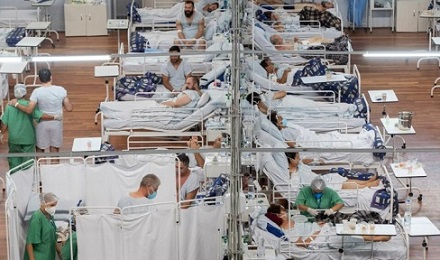Brazil’s Healthcare Doomed As COVID-19 Infections Rise Along With Dengue, Flu, RSV, Malaria, Zika, Measles, TB, HIV And Cholera Infections!
Nikhil Prasad Fact checked by:Thailand Medical News Team Mar 04, 2024 1 year, 1 month, 2 weeks, 3 hours, 25 minutes ago
COVID-19 News: As Brazil grapples with the relentless onslaught of the COVID-19 pandemic, recent data released by the Fiocruz InfoGripe Bulletin paints a grim picture of the country's healthcare system. The report, unveiled on February 29th, reveals a concerning surge in COVID-19 cases, with an alarming twist. Not only is the COVID-19 crisis escalating, but Brazil is also witnessing a simultaneous rise in infections of Dengue, Malaria, Measles, Tuberculosis (TB), Human Immunodeficiency Virus (HIV), and Cholera.
 Hospitals Across Brazil Currently Overwhelmed Due To Risng Cases Of
Hospitals Across Brazil Currently Overwhelmed Due To Risng Cases Of
COVID-19, Dengue, Measles, HIV, etc
Local
COVID-19 News coverages show that most hospitals and emergency rooms across Brazil are inundated with sick individuals and causing a near collapse of the country’s public healthcare infrastructure.
Worrisome Regional Trends
The bulletin identifies a significant increase in respiratory infections and pneumonia cases linked to COVID-19 across the Central-South regions of Brazil. The Southeast, Central-West, and South regions are particularly hard-hit, displaying clear indicators of an upswing in COVID-19-related respiratory distress. Disturbingly, most states in the Center-South exhibit this upward trajectory, hinting at a widespread and escalating health crisis.
The Northeastern states are not immune to the surge, with some displaying signs of increased SARS, albeit the infectious agent responsible remains unclear. In Bahia, however, there is a notable association with influenza A, commonly known as the flu virus. The scenario raises concerns about potential co-circulation of viruses, complicating the healthcare landscape further.
https://agencia.fiocruz.br/sites/agencia.fiocruz.br/files/u91/resumo_infogripe_2024_08.pdf
Expert Analysis and Recommendations
Marcelo Gomes, a researcher from the Scientific Computing Program and coordinator of InfoGripe, emphasizes the gravity of the situation. Gomes underscores the national concern, emphasizing the troublesome co-circulation of COVID-19 and Influenza A in several Central-South states. Despite COVID-19 causing a significantly higher number of hospitalizations than the flu, the simultaneous circulation of both viruses poses unprecedented challenges to the already strained healthcare infrastructure.
Gomes reiterates the importance of adhering to preventive measures, urging individuals with respiratory infection symptoms to stay at home and rest. For those compelled to venture outside, the use of appropriate masks, such as PFF2 or N95, is strongly advised to curb virus transmission, especially when visiting healthcare facilities.
National Overview of COVID-19
Examining both long-term (last six weeks) and short-term (last three weeks) trends, the report identifies an
alarming growth in respiratory infections incidence and mortality associated with COVID-19. Over the last eight weeks, the impact of respiratory infections remains most pronounced among young children and the elderly, with COVID-19 disproportionately affecting those under two years old and individuals over 65.
The report highlights other respiratory viruses, such as Respiratory Syncytial Virus (RSV) and rhinovirus, as significant contributors to respiratory infections incidence in young children. However, the mortality rates for respiratory infections, particularly related to COVID-19, remain significantly higher in the elderly population.
Regional Breakdown of Respiratory Infection Increases
Eighteen states exhibit concerning signs of long-term respiratory infections growth, including Bahia, Ceará, Distrito Federal, Espírito Santo, Goiás, Maranhão, Mato Grosso, Mato Grosso do Sul, Minas Gerais, Pará, Paraíba, Paraná, Rio Grande do Sul, Rio de Janeiro, Roraima, Santa Catarina, Sergipe, and São Paulo.
Specifically related to respiratory infection cases due to COVID-19, the Federal District, Espírito Santo, Goiás, Minas Gerais, Mato Grosso, Mato Grosso do Sul, Paraná, Rio de Janeiro, Rio Grande do Sul, Santa Catarina, and São Paulo display an alarming increase.
In Bahia, Rio de Janeiro, Rio Grande do Sul, Santa Catarina, and São Paulo, there is evidence of increased respiratory infections caused by influenza A (flu). In some states like Ceará, Maranhão, Pará, Paraíba, and Roraima, the rise in respiratory infections is concentrated among children, with the responsible viral agent yet to be determined.
City-Specific Concerns
Seventeen capitals across Brazil are witnessing a surge in severe respiratory infection cases, including Aracaju (SE), Belém (PA), Boa Vista (RR), Campo Grande (MS), Cuiabá (MT), Curitiba (PR), Florianópolis (SC), Fortaleza (CE), Goiânia (GO), João Pessoa (PB), Maceió (AL), Porto Velho (RO), Rio de Janeiro (RJ), Salvador (BA), São Luís (MA), São Paulo (SP), and Vitória (ES).
Respiratory Virus Prevalence and Mortality
Over the past four epidemiological weeks, the prevalence among cases with positive results for respiratory viruses included influenza A (10.3%), influenza B (0.3%), RSV (10.8%), and Sars-CoV-2/Covid-19 (70.6%). Among deaths, these viruses were present in influenza A (2.5%), influenza B (0.6%), RSV (0.6%), and SARS-CoV-2/COVID-19 (92.5%).
In the epidemiological year 2024, 10,985 Respiratory infection cases have been reported, with 37.7% having a positive laboratory result for a respiratory virus. COVID-19 dominates, comprising 69.6% of positive cases. Despite ongoing investigations, the fluid nature of case notifications and laboratory result insertions necessitates ongoing updates.
SARS-CoV-2 Variants At Play In Brazil
Based on data collated by Thailand
Medical News, the predominating SARS-CoV-2 sub-lineages circulating in Brazil at the moment are JN.2.5, JN.1.7, JN.1.1 and JN.1.
Dengue Rising at exponential rates in Brazil
Refer:
https://www.thailandmedical.news/news/brazil-records-more-than-1-million-cases-of-dengue-and-214-deaths-for-first-two-months-of-2024
Conclusion
Brazil is facing a healthcare crisis of unprecedented proportions as COVID-19 collides with a surge in other infectious diseases. The widespread growth of SARS, coupled with the co-circulation of COVID-19 and Influenza A, underscores the urgent need for comprehensive public health measures, increased testing, and robust healthcare infrastructure.
As the nation grapples with this multifaceted challenge, coordinated efforts at local, regional, and national levels are imperative. The findings from the Fiocruz InfoGripe Bulletin serve as a stark reminder that Brazil's healthcare system is on the brink, necessitating immediate and sustained interventions to prevent further escalation of the crisis.
For the latest
COVID-19 News, keep on logging to Thailand Medical News.
